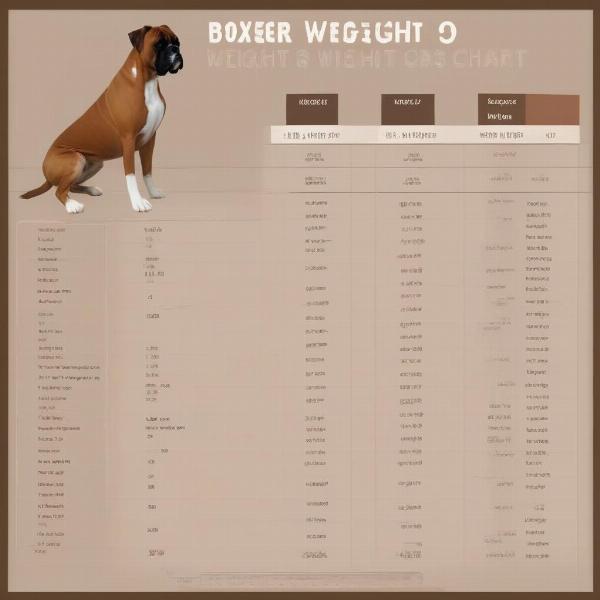Understanding your Boxer’s ideal weight is crucial for their overall health and well-being. A healthy weight minimizes the risk of joint problems, heart disease, and other health issues common in Boxers. This comprehensive guide will provide you with a detailed Boxer dog weight chart, explain the factors influencing their weight, and offer practical tips for maintaining a healthy weight for your beloved companion.
Boxer Dog Weight Chart by Age and Gender
Several factors contribute to a Boxer’s ideal weight, including age, gender, and individual genetics. While a general Boxer dog weight chart offers a helpful guideline, it’s essential to remember that individual variations exist. Consult with your veterinarian to determine the optimal weight range for your specific Boxer.
Here’s a general Boxer dog weight chart to give you an idea of what to expect:
| Age (Months) | Male (lbs) | Female (lbs) |
|---|---|---|
| 2 | 15-20 | 13-18 |
| 4 | 30-35 | 25-30 |
| 6 | 45-50 | 40-45 |
| 8 | 55-60 | 50-55 |
| 12 | 60-70 | 55-65 |
| Adult (1+ years) | 65-80 | 50-65 |
 Boxer Dog Weight Chart
Boxer Dog Weight Chart
Factors Influencing a Boxer’s Weight
While the Boxer dog weight chart provides a helpful framework, several factors can influence an individual Boxer’s weight. These include:
- Genetics: Just like humans, some Boxers are genetically predisposed to be larger or smaller than others.
- Diet: A balanced and appropriate diet is fundamental to maintaining a healthy weight.
- Exercise: Regular physical activity is essential for burning calories and building muscle.
- Neutering/Spaying: These procedures can sometimes lead to weight gain.
- Health Conditions: Certain medical conditions can impact a dog’s metabolism and weight.
How to Tell if Your Boxer is Overweight or Underweight
Knowing how to assess your Boxer’s weight is crucial. Aside from referencing a Boxer dog weight chart, you can perform a simple hands-on check. You should be able to feel your dog’s ribs easily but not see them prominently. If the ribs are difficult to feel under a layer of fat, your Boxer is likely overweight. Conversely, if the ribs are very prominent and easily visible, your Boxer may be underweight.
Maintaining a Healthy Weight for Your Boxer
Maintaining your Boxer’s ideal weight requires a multifaceted approach:
- Consult your Veterinarian: Your vet can provide personalized guidance based on your Boxer’s individual needs. They can also rule out any underlying medical conditions that might be contributing to weight problems.
- Balanced Diet: Feed your Boxer a high-quality, balanced diet appropriate for their age and activity level. Avoid overfeeding and be mindful of treats.
- Regular Exercise: Provide ample opportunities for exercise, such as daily walks, runs, and playtime.
- Monitor Weight Regularly: Keep track of your Boxer’s weight and consult your veterinarian if you notice any significant changes.
What is the ideal weight for a female boxer?
A female Boxer’s ideal weight typically ranges from 50 to 65 pounds.
How much should a male boxer weigh?
A male Boxer generally weighs between 65 and 80 pounds in adulthood.
Conclusion
By understanding the Boxer dog weight chart and the factors that influence their weight, you can take proactive steps to ensure your Boxer maintains a healthy weight throughout their life. Remember to consult your veterinarian for personalized advice and guidance. A healthy weight contributes significantly to a longer, happier, and more active life for your Boxer companion.
FAQ
- How often should I weigh my Boxer? It’s a good idea to weigh your Boxer monthly to monitor any changes.
- What should I do if my Boxer is overweight? Consult your veterinarian to develop a weight loss plan, which typically involves dietary adjustments and increased exercise.
- Can spaying/neutering cause weight gain in Boxers? Yes, these procedures can sometimes slow down metabolism and contribute to weight gain.
- Is it important to follow a Boxer dog weight chart specifically? While a breed-specific chart provides a general guideline, it’s essential to consider individual factors and consult your vet.
- What are the signs of obesity in Boxers? Difficulty feeling the ribs, a lack of a defined waistline, and lethargy are some common signs.
- Can being underweight be a problem for Boxers? Yes, being underweight can weaken the immune system and lead to other health issues.
- How can I encourage my Boxer to exercise more? Try interactive games like fetch or frisbee, or consider enrolling them in obedience or agility classes.
ILM Dog is a leading international website dedicated to providing expert advice on all aspects of dog care and breeding. We offer a comprehensive resource covering breed selection, health care, training, nutrition, grooming, and much more. Whether you are a new dog owner or a seasoned expert, ILM Dog has the information you need to provide the best possible care for your canine companion. Contact us today for any questions or inquiries: [email protected] or +44 20-3965-8624. For more expert advice, visit us at ILM Dog.